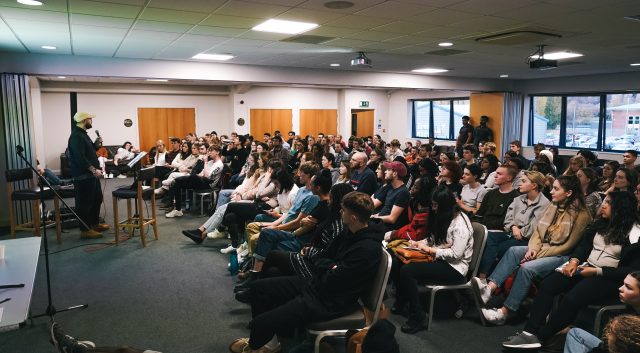Anne Coles shares her thoughts on Women in the Church.
I heard of a baptism service in which the men and women who were about to be baptised were each asked to give an account of their turning to Christ for salvation. The men each stood up and gave their story, then the women who had written theirs handed it to the men who read it out. In this way the church tried to be obedient to the understanding that women should not speak in church! In another church I know, a male parishioner does not come to Sunday service when the woman priest on the team is presiding at communion; he believes that Jesus handed this task on exclusively to men.
I could continue with stories of similar discrimination against women and maybe these are extreme cases. But we would probably be surprised that even in churches which are trying to accept male and female without distinction, women can feel inferior because of their gender. A professional woman in our church remarked that she had noticed that she behaved differently in church than in the workplace. She instinctively took on a spiritual ‘dumb blonde’ persona in church circles. As we talked together she realised this was unnecessary. Many of us see men in upfront leadership roles and conclude wrongly that there is no place for women here, — they are only needed for backroom ministry.
She instinctively took on a spiritual ‘dumb blonde’ persona in church circles
What can we learn from Jesus about his relationship to women? Of course, Jesus lived in a different society and culture from ours; girls were not educated to the same extent as boys, girls did not have therefore the same opportunities or abilities, — marriage and motherhood were the only possibility for respectable girls. Without a husband and children, a woman was vulnerable and to be pitied. Against this background Jesus treated women with respect, dignity and honour. It is not true that he only had men in his inner circle, there were notable women there too (Luke 8:1-3).
These women were a complete mixture too — Joanna the wife of a well-known man of the time, Mary from the probably dubious background of prostitution and Susanna — well everyone knew her! It was a woman, Mary, Jesus especially commended for her choice to sit and listen to him (Luke 10:42) and another woman whom he commended for all time for her extravagant gift of perfume poured over his feet at supper (Matt 26:13) He was not patronising in discussion with a woman who wanted her daughter healed (Matt 15:28) and he championed the desires of the mothers for their children to be near Jesus (Matt 19:13)
Finally it was the women who stayed at the cross as Jesus died (Matt 27:55) and it was the women who watched Jesus’ burial (Matt 27:61) It was to the women that the angel announced the resurrection (Matt28:5) as it was to the women that Jesus first appeared in his resurrection body (Matt 28:9) and then, rather surprisingly in the light of subsequent church history, it was the women whom Jesus commissioned to take the story of his resurrection to the men! (Matt 28:10) Matthew and the other male gospel writers faithfully recount the part that the women played in the most crucial and important events in Jesus life. These historical facts of the cross and the resurrection are, I believe, the fulcrum of our world history and the foundation of the New Testament church.
I don’t believe that Paul was the male chauvinist that he is often made out to be.
So what happened to the women in that New Testament church? We don’t have to look very far to find that they were all there, sometimes leading their house church as Lydia did, (Acts 16:40) sometimes renowned for their prophetic ministry as the four unmarried daughters of Philip the evangelist were, (Acts 21:9) sometimes teaching the truth of the gospel as Priscilla did (Acts 18:26) But wasn’t Paul the one who put a stop to women’s ministry, I hear you say, -the one who taught the church to keep women quiet and out of the way?
I don’t believe that Paul was the male chauvinist that he is often made out to be. I believe that in practice, Paul, like Jesus, respected, commended and honoured the women who laboured alongside him. The letter to the Romans is one of Paul’s most significant pieces of writing and at the end of it he spends a whole chapter greeting his co-workers, many of whom are women. The first name he mentions, Phoebe, is leader of the church in Cenchrea and obviously this was no mean church! Then he mentions Priscilla as a courageous fellow worker and church leader with her husband, his relative Junia is called an apostle, several women are mentioned by name for their hard work – they were probably pastors, a 24/7 job! In fact a third of the names in this list of church-leaders are women, and that in a day when there were no dishwashers or supermarkets!
Paul, like Jesus, respected, commended and honoured the women who laboured alongside him.
But what about Paul’s teaching? I believe that he exhorted women to take learning seriously where they had previously been uneducated (1 Tim 2:11), to teach the truth of the gospel and not heresy, to be humble and respectful not domineering (v12) -in other words, to submit to one another, honour one another and preach the gospel. This is the injunction on both men and women who are called to be servant-leaders in the church of Christ. This is a liberating message for women.
Some argue that Paul did not believe in women leading men. They quote verses about the man being the head of the woman. (1 Cor 11:3 NIV) Now I want you to realize that the head of every man is Christ, and the head of the woman is man, and the head of Christ is God. We believe that the Father, Son and the Spirit are three in one, co-equal but different in function. The Father sends the Son and the Son sends the Holy Spirit; in this sense head is to be understood as fountainhead or source. We have here an illustration of the way men can and should release the ministry of women.
The sad fact is, that, far from releasing, much of the church has restricted the ministry of women. Nevertheless I believe that God has used even this human restriction to disperse the anointed evangelistic gifting of many women to different corners of the world and to marginalised areas of our society. Nothing can stop the work of a Jackie Pullinger and a Catherine Booth when God calls them.
The Holy Spirit gifts and anoints whomever He will, male and female.
The wonderful thing about living in these days of the Spirit, is that the Holy Spirit gifts and anoints whomever He will, male and female, there is now no distinction. The prophet Joel predicted these days (Joel 2:28) and Peter spoke up at Pentecost and said ‘This is that! (Acts 2:17 NIV) “‘In the last days, God says, I will pour out my Spirit on all people. Your sons and daughters will prophesy, your young men will see visions, your old men will dream dreams.18 Even on my servants, both men and women, I will pour out my Spirit in those days, and they will prophesy. The fact that the lack of distinction between male and female is mentioned twice is indicative of its importance. One of the marks of Holy Spirit renewal is, I believe, men and women working alongside one another under the anointing of the Holy Spirit. We quench the work of the Holy Spirit if we quench women in their ministry.
We cannot leave the task of building the kingdom of God to 50% of the workforce — the men.
So why do we still not see so many women in visible roles in the church today? Part of the answer must lie in the fact that in a society which increasingly undervalues the role of motherhood, Christian mothers are taking this role seriously and in many cases sacrifice career opportunities for the sake of a secure and godly family. We need to learn to applaud and honour the task that mothers do, they are building the backbone of our society. This is a holy calling (1Tim 2:15) But there are many single and childfree women, as well as those who have children and helpers, in our churches too. We need to learn to release them too into the calling and anointing that the Holy Spirit has for them. We cannot leave the task of building the kingdom of God to 50% of the workforce — the men.
There is too much to do, the fields are already white for harvesting and God is calling us all, men and women, to labour with Him. Lets go for it together!










